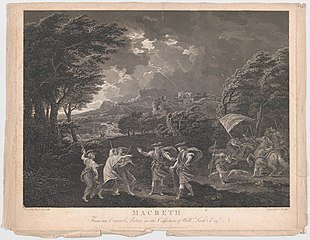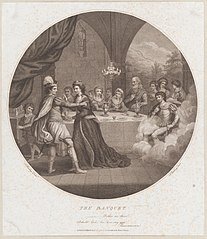Shakespeare uses special writing tricks that make his language in “Macbeth” more beautiful and deep. These tricks also help him express the complicated feelings and ideas in the story.
The following are important literary devices in Macbeth that help convey the complex emotions and themes of “Macbeth”.

Literary Devices in Macbeth
Simile
Life’s but a walking shadow, a poor player, that struts and frets his hour upon the stage, and then is heard no more. In this simile, Macbeth compares life to a fleeting and insignificant actor on a stage.
Irony
False face must hide what the false heart doth know. This line from Macbeth highlights the irony of concealing one’s true intentions behind a deceptive appearance.
Metonymy
The crown does sear mine eyeballs. Here, “the crown” represents the burdens and responsibilities of kingship, using metonymy to stand for the king’s entire role.
Oxymoron
Parting is such sweet sorrow. Although not from “Macbeth,” this Shakespearean oxymoron captures the complex emotions of love and separation.
Daily Test - Attempt Now
Anachronism
I pull in resolution and begin to doubt th’ equivocation of the fiend that lies like truth. Macbeth’s reference to “equivocation” is an anachronism, as the term was not commonly used during the play’s historical setting but reflects later theological debates.
Antithesis
Fair is foul, and foul is fair. This famous antithesis in the opening scene of the play sets the tone for the play’s exploration of paradoxes and moral ambiguity.
Hyperbaton
Tomorrow, and tomorrow, and tomorrow. The repetition of “tomorrow” and the unusual word order in this famous soliloquy create a sense of hopelessness and despair.
Euphemism
Sleep no more! Macbeth uses “sleep” as a euphemism for death in this famous line.
Parody
Thou cream-faced loon! The Porter’s speech in Act II, Scene III is a parody of a gatekeeper’s duties, filled with dark humor.
Epithet
Bloody, bold, and resolute. These epithets used to describe Macbeth in Act I, Scene II emphasize his bravery and ruthless nature.
Chiasmus
So oft it chances in particular men that for some vicious mole of nature in them, as in their birth—wherein they are not guilty, since nature cannot choose his origin—by the o’ergrowth of some complexion, oft breaking down the pales and forts of reason. In this passage, chiasmus is used to mirror the reversal of reason and compulsion in human nature.
Also, Read

Themes of Macbeth

Macbeth Plot Summary

